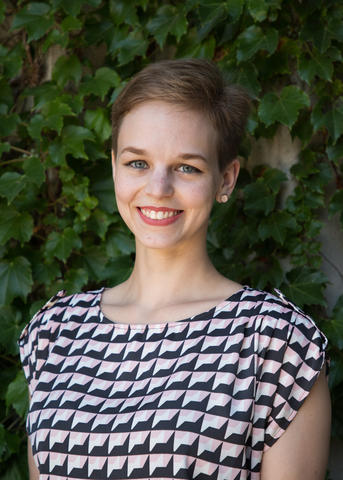
Natalie Lopresti
PhD Thesis Title:
Sex Differences in Morphine Reward and Glutamatergic Regulation of the Nucleus Accumbens.
Current Position:
Scientific Support Specialist, Bio-Techne
Undergraduate Institution and Major:
University of Maryland, Baltimore County (UMBC), Biochemistry & Molecular Biology
Graduate Advisor:
Paul Mermelstein, PhD, Department of Neuroscience
Description of Graduate Research:
My graduate research focuses on examining neural circuitry involved in addiction, specifically with different lengths of drug exposure, various drugs of abuse, and any differences between males and females. I also am studying sex differences in opioid addiction. Women are more likely to become addicted than men, and recent research has suggested that this may be due to levels of estrogen in the female body. My work is examining these differences between men and women, specifically in the nucleus accumbens reward pathway.
Graduate Publications:
- Lopresti NM, Esguerra M, Mermelstein PG. Sex differences in animal models of opioid reward. Curr Sex Health Rep. 2020;12(3):186-194.
- Eisinger KRT, Chapp AD, Swanson SP, Tam D, Lopresti NM, Larson EB, Thomas MJ, Lanier LM, Mermelstein PG. Caveolin-1 regulates medium spiny neuron structural and functional plasticity. Psychopharmacology (Berl). 2020;237(9):2673-2684.
Graduate Oral Presentations
- Sex differences in morphine reward. Graduate Program in Neuroscience Colloquium Series. October 21, 2020.
Graduate Abstracts:
- Lopresti NM, Chapp AD, Swanson, SP, Thomas MJ, Mermelstein PG. Sex differences in morphine reward. Symposium on Addiction Neuroscience, 2019. Poster.
- Steenrod NM, Larson EB, Mermelstein PG, Thomas MJ. The estrous cycle alters optogenetic self-stimulation of glutamatergic terminals in the mouse nucleus accumbens. Neuromodulation Symposium, 2018. Poster.
- Steenrod NM, Larson EB, Mermelstein PG, Thomas MJ. The estrous cycle alters optogenetic self-stimulation of glutamatergic terminals in the mouse nucleus accumbens. Society for Neuroscience, 2017. Poster.
Graduate Honors:
- NIDA Training Grant Fellowship 2018-present
Graduate Committees:
- Graduate Program in Neuroscience Social Media Committee, 2017-Present
- Graduate Program in Neuroscience Recruitment and Marketing Committee, 2016-Present
- Graduate Program in Neuroscience Recruitment and Marketing Subcommittee, 2016-Present
Professional Societies:
- American Association for the Advancement of Science, 2018-Present
- Society for Neuroscience, 2017-Present
Thesis Committee Members:
- Ben Hayden, Ph.D., Department of Neuroscience (Chair)
- Paul Mermelstein, Ph.D., Department of Neuroscience
- Julia Lemos, Ph.D., Department of Neuroscience
- Mark Thomas, Ph.D., Department of Neuroscience and Psychology
- Patrick Rothwell, Ph.D., Deparment of Neuroscience
Research Categories:
- Neuroendocrine and Homeostatic Systems
- Neuroscience of Drug Abuse and Addiction
Rotations:
- Michael Lee, Ph.D., Department of Neuroscience
- Esther Krook-Magnuson, Ph.D., Department of Neuroscience
- Marija Cvetanovic, Ph.D., Department of Neuroscience
- Mark Thomas, Ph.D., Departments of Neuroscience and Psychology
- Paul Mermelstein, Ph.D., Department of Neuroscience
What Got You Interested In Research?
I have always been curious about the world around me, and was encouraged to ask questions and expand my knowledge base throughout my childhood. Eventually, a genetics class in high school convinced me that I was interested in life science.
Why Did You Choose MN?
The University of Minnesota was my number one choice. I was excited about Itasca, our four week long introduction to neuroscience course during the month of August up at Lake Itasca, as well as the close-knit community of both students and faculty. During student presentations, faculty and students knew each other by name and were conversing as equals, which showed me that this program wanted to teach you how to be a scientist, as well as help you understand that the faculty here will eventually be your colleagues. There are also opportunities to explore career paths other than academia.
Student Mentor and the Best Advice They Gave:
Julia Gamache: The key to the first year is finding the balance between classes and lab. The other important thing is that the faculty mentor is ultimately the most important thing in picking a lab. The research needs to be interesting, but if you don’t get along with your PI, it will be a miserable 5+ years.
Favorite Itasca Memory:
My favorite memory from Itasca is the cohort paddle boarding on Lake Itasca together. We took out 8 paddleboards and one kayak and went out into the middle of the lake. We then attached them all together using the ankle straps on the paddleboards, and then jumped into the water to enjoy the sun and company of the cohort.
